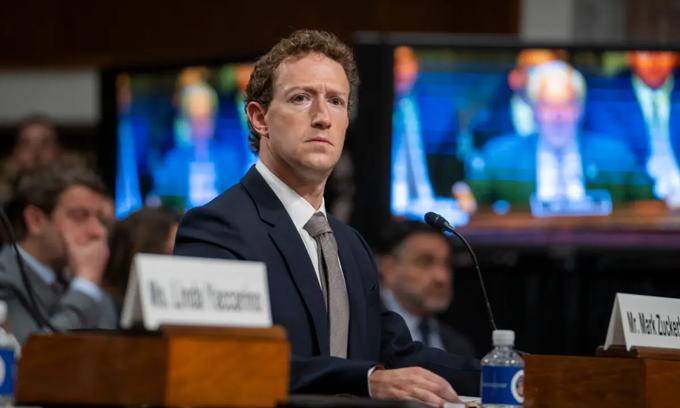Meta CEO Mark Zuckerberg apologized to the families and parents of children who have been harmed by his social media platforms during an intense hearing on Capitol Hill on Wednesday.
Mr. Zuckerberg issued the rare apology after being questioned by lawmakers during a Senate Judiciary Committee hearing titled “Big Tech and the Online Child Sexual Exploitation Crisis,” which examined the impacts of social media on children and the numerous child safety issues related to their use of such sites.
Some of the parents who attended the hearing told lawmakers that their children had been exploited, bullied, or molested online while using one of Mr. Zuckerberg’s many platforms.
Others said their children had suffered various mental health issues, including developing eating disorders and depression, as a result of using the sites. Some of the parents had lost their children to drug overdoses from narcotics purchased on the platforms or by suicide.
Many of the parents in attendance during Wednesday’s hearing held up photos of their deceased children.
Mr. Zuckerberg stood up and awkwardly addressed the families before issuing his apology.
“I’m sorry for everything you have all been through,” he said.
“No one should go through the things that your families have suffered, and this is why we invest so much, and we are going to continue doing industry-wide efforts to make sure no one has to go through the things your families have had to suffer.”
Prompted by Senator
Mr. Zuckerberg’s apology came after intense questioning by Sen. Josh Hawley (R-Mo.), who asked if the billionaire businessman had ever said sorry to any of the individuals who claimed his social media platforms harmed them or whether he had considered compensating the families who have suffered due to what he said was Mr. Zuckerberg’s “inaction.”
Mr. Hawley told Mr. Zuckerberg that he was responsible for his company’s actions as CEO.
“You have made billions of dollars on the people sitting behind you here. You’ve done nothing to help them, you’ve done nothing to compensate them, and you’ve done nothing to put it right. You could do so here today, and you should,” Mr. Hawley said.
Mr. Zuckerberg—whose company Meta owns Facebook, Instagram, and WhatsApp—dodged compensation questions before apologizing to the parents and families of those harmed by his social media products.
Elsewhere during the hearing, Mr. Hawley highlighted a Wall Street Journal investigation in 2021 that suggested Meta knew its platform Instagram had harmful impacts on the mental health of teenagers. Meta employee turned whistleblower Frances Haugen leaked documents to the publication showing the social media giant was aware as early as 2019 that Instagram had a “toxic” impact on young girls’ self-esteem.
However, Mr. Zuckerberg disputed Mr. Hawley’s referring to the details in the Wall Street Journal investigation as “facts” during the hearing, stating they were not “facts” before accusing the lawmaker of cherrypicking the research.
A spokesperson for Meta later told The New York Post that “these cherry-picked documents do not provide the full context of how the company operates or what decisions were made.”
The Epoch Times has contacted Meta for further comment.
‘You Have Blood on Your Hands’
During the hearing, Mr. Zuckerberg cited a recent report from the National Academies of Sciences that evaluated results from more than 300 studies and determined that the research “did not support the conclusion that social media causes changes in adolescent mental health at the population level.”
The businessman later said the report “also suggested that social media can provide significant positive benefits when young people use it to express themselves, explore, and connect with others.”
However, his comments appeared to do little to appease lawmakers in attendance at the hearing, with Sen. Lindsey Graham (R-S.C.) telling the Meta CEO, “Mr. Zuckerberg, you and the companies before us, I know you don’t mean it to be so, but you have blood on your hands.”
The Republican added that Mr. Zuckerberg was providing “a product that is killing people.”
Mr. Zuckerberg was not the only social media CEO in attendance during Wednesday’s hearing—X CEO Linda Yaccarino, TikTok CEO Shou Chew, Snap co-founder and CEO Evan Spiegel, and Discord co-founder and CEO Jason Citron were also questioned for hours by lawmakers on both sides of the aisle over their child safety procedures across their various platforms.
The CEOs all touted their child safety protections online but vowed to work with lawmakers, parents, nonprofits, and law enforcement officials to protect minors using their social media platforms.
Meta Rolls Out Content Restrictions
Wednesday’s hearing comes as Meta is facing a string of lawsuits from dozens of states alleging the company designed its platforms with “harmful and psychologically manipulative product features” to induce young users to compulsively use the apps for extended periods of time while “falsely assuring the public that its features were safe and suitable for young users.”
The lawsuits also argue that Meta’s apps promote body dysmorphia and expose underage users to potentially harmful content.
Meta has repeatedly denied those claims.
Earlier this month, the company said it would restrict the type of content that teenagers can see on its platforms in the near future as part of wider efforts to ensure the social networks are safer and more “age-appropriate” for young users under the age of 18.
The social media giant said the new restrictions followed consultations with “experts in adolescent development, psychology, and mental health” and are designed to make sure it is harder for teenagers to view and search for sensitive content such as suicide, self-harm, and eating disorders on Instagram and Facebook.
Teens attempting to access such content across those apps will instead be diverted to resources, including information from organizations like the National Alliance on Mental Illness, Meta said.
At the time, Meta said that while it allows people to share content discussing their own struggles with suicide, self-harm, and eating disorders on its platforms, its policy is “not to recommend this content” to users, adding that it has been “focused on ways to make it harder to find.”



















I’ll believe his apology, as much as a 2 yr old can throw him.
I don’t like this guy